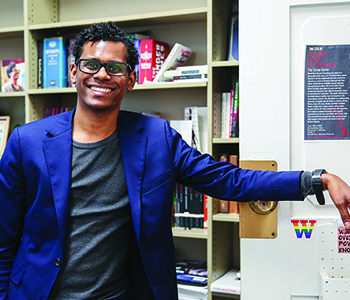Like many freshmen during their first year on campus, Julian Whitney felt lost when he initially joined the Wabash faculty in 2020.
“There was no sense of community, not because it didn’t exist, but because it had been put on hold,” says Whitney, an assistant professor of English from New York City, who came to Crawfordsville to teach in the midst of the COVID-19 pandemic.
 “For about the first year and a half,” he says, “I wasn’t really able to establish connections with anybody on campus.”
“For about the first year and a half,” he says, “I wasn’t really able to establish connections with anybody on campus.”
Whitney used that time to reflect and refocus on who he wanted to become as a young professor and scholar.
“The summer of 2021 was a turning point, an opportunity for me to try and remake myself,” he says.
Whitney’s academic interests range from 18th-century British literature and British Romanticism to law and literature and critical race studies. He also has a long and diverse list of “other interests” that he’s eagerly pursued over the past two years.
“I focused on the things I may have wanted to do many years ago, but always felt like academia or the job market was getting in the way,” he says. “Now, having a tenure-track position has given me the opportunity to engage those other interests I had to put on hold.”
Whitney has found support among the members of the Wabash English department and the surrounding Crawfordsville community. They’ve encouraged him to explore new ways of learning and pushed him outside of his comfort zone.
He created and is teaching a new course focused on Japanese manga and anime. He’s also learning how to speak and write in Japanese, taking guitar lessons, and participating in one-on-one tennis lessons.
“The flexibility to experiment is something I have never had the chance to do before, and it’s one of the really good things about this job,” says Whitney. “One of the most important parts of being a professor is recognizing the limits of what you know and don’t know. That provides the incentive to want to go and learn new things.
“That’s one of the reasons I try to commit myself to always being a student,” he continues. “There’s a sense of gratification that comes from learning a new skill, and being able to experience what it’s like when you feel like you’ve accomplished something in cultivating that skill.”
His office reflects his varied interests. He’s surrounded by shelves full of novels—some favorites include 18th-century writer Quobna Ottobah Cugoano’s “Thoughts and Sentiments on the Evil of Slavery” and a collection of “Dragon Ball Z” comic books. A “Final Fantasy” plush toy stands next to a framed print. Miniature Black Lives Matter and LGBTQ+ pride flags are displayed. And a white board is covered in carefully constructed Japanese symbols and words.
“I’m having a lot of fun,” Whitney says with a smile as he sits in his Center Hall office.
“I tell my students, ‘Be courageous enough to explore,’” he says. “A liberal arts education is designed precisely for that, to encourage you to step outside of your comfort zone and give you a better, more rounded sense of who you actually are.”